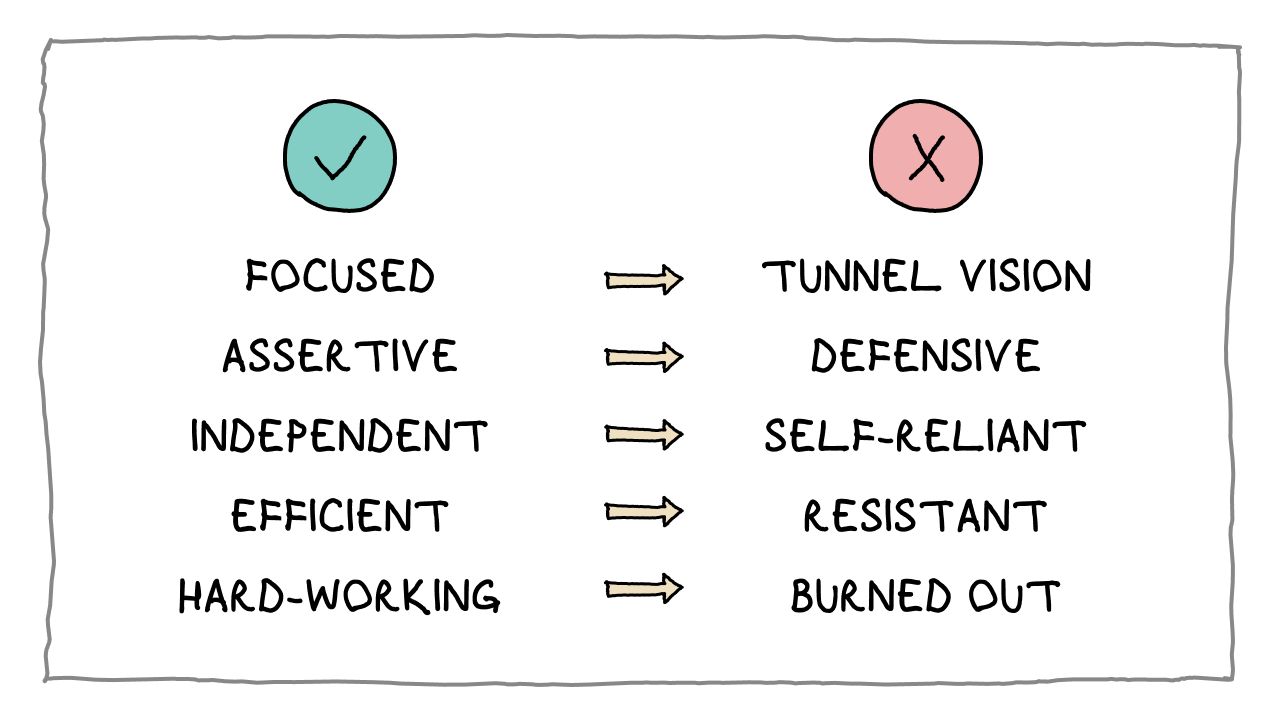Why Founders Don’t Always Make Great CEOs
Written by Dave Bailey
Your strengths and weaknesses may be more connected than you realise.
It takes great assertiveness, focus, and hustle to get a new company off the ground. If you’re an early-stage founder, you likely have these strengths in abundance, and if they can take you from Zero to One, they can take you all the way, right?
Well, not quite. I quickly discovered that these strengths came with a darker side. My assertiveness sometimes came off as aggressive; my focus often stopped me from seeing the bigger picture. And the constant hustle, over many years, brought me close to burn out.
‘What got you here won’t get you there.’ — Marshall Goldsmith
As my companies developed, I had to develop along with them. And for me — just like the founder of any fast-growing company — that meant a lot of personal growth.
Learn new skills every week ->
The Fine Line Between Strength and Weakness
 Strengths and weaknesses are deeply interconnected. Let’s look at some of the most common examples among early-stage founders — and consider some new skills you might want to cultivate as the business scales.
Strengths and weaknesses are deeply interconnected. Let’s look at some of the most common examples among early-stage founders — and consider some new skills you might want to cultivate as the business scales.
1) Focus versus tunnel vision
It takes tremendous focus to get a new product out the door. I’ve always found it easy to get into a state of flow whenever I’m building something — whether it’s developing, designing, analysing, or writing. But while intense concentration on your immediate work can lead to great results, it comes at a cost: it’s easy to disappear down the rabbit hole and lose sight of the bigger picture . . . and the rest of the team.
If you’re hyper-focused, you should cultivate awareness. Seek differing perspectives, ‘get out of the building’, and regularly ask yourself, ‘What’s the big picture here?’
2) Assertive versus defensive
An assertive mindset helps you to ignore the nay-sayers, and to recruit investors and talent to the team. But the ability to present and defend your ideas with confidence can sometimes create the impression that you’re not listening. Eventually, your team may stop challenging your ideas and you’ll start to wonder why everyone is silent around you.
If you’re a hyper-assertive type, you should cultivate curiosity. Practice ‘assertive listening’ by leading with questions rather than your answer. Be the last person to speak and pay attention to the ideas, preferences, and values of other people.
3) Independence versus self-reliance
‘I did it my way.’ — Frank Sinatra
For many founders, starting a business is the ultimate expression of independence. You don’t need permission from others, just an internal drive and big ambitions. However, highly independent people are more likely to find it difficult to depend on others. Their preference for doing things alone can translate into a resistance to delegation. And as the headcount in your business grows, this behaviour can strangle it.
If you’re hyper-independent, you should cultivate collaboration. Actively look for ways to bring others into your work, and practice delegating problems, not tasks.
4) Efficient versus resistance to change
Many founders have a relentless focus on their own productivity under the mantra of, ‘Get more done in less time.’
‘What’s wrong with a drive towards efficiency?’ I hear you ask.
Well, it took me a while to see clearly, but the drive for efficiency is biased towards incrementalism — making things a little bit better. This can lead to the avoidance — or outright rejection — of radical changes that may make things worse before they get a lot better.
If you’re hyper-efficient, you should practice openness to change. Take time to step back and consider ‘radical ideas’. Sometimes you have to put the best interests of the company above your own efficiency.
Learn new skills every week ->
5) Hard-working versus burned out
The ability to work 60-hour weeks, for months at a time, comes with the title of ‘founder’. However, many founders find out that they aren’t superhuman after all, and that even they can’t do everything. Tiredness eventually catches up with you and, if you’re not careful, you’ll erode your social life to the point where it doesn’t exist.
If you’re one of these workhorses, you should practice balance. Learn to be your own ‘good boss’ by making time for exercise, sleep, socialising, solitude, and the odd vacation every 3–6 months. Practice saying ‘no’ to work without feeling guilty.
Too much of a good thing
Taking the time to identify your strengths, and their associated potential weaknesses, can help you to become more self-aware, as well as enabling you to spot the strengths and weaknesses of others more easily. Try writing a list of your biggest strengths and challenge yourself to identify potential blind spots. Which strengths can you develop to mitigate these potential weaknesses?
Ironically, identifying your weaknesses can become a strength in itself — and it’s one we can all cultivate. The most dangerous weakness is the one you aren’t aware of.
Continue reading about CEO leadership:
- What is your management approach? Learn why leading with compassion is the best approach for startups.
- Are your employees lacking motivation? Discover how team assertiveness can motivate your employees.
- Working closely with a startup CEO? Explore the reasons why CEOs are productive narcissists.
Originally published Sep 17, 2019, last updated Nov 14, 2023
Learn a new skill every week
Subscribe to my weekly newsletter and learn new skills and mental frameworks that make startup life easier.
Unsubscribe any time.





